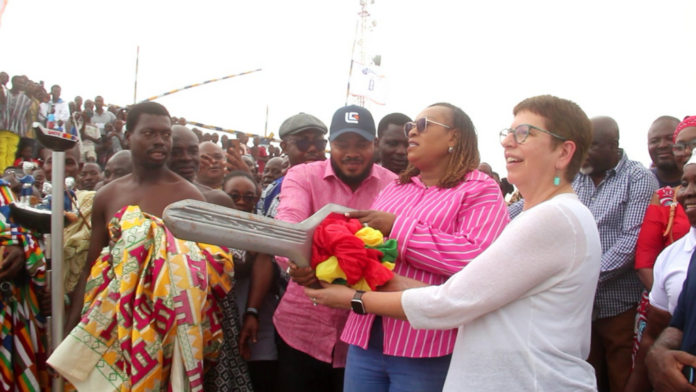Fisheries Minister Mavis Hawa Koomson has reiterated government’s commitment to sustainable fisheries management and its contribution to the country’s economic development.
She stated government’s ongoing efforts to introduce new technologies, improve infrastructure, implement alternative livelihood programs, and provide training and capacity building for fishers and women processors.
Speaking at the symbolic opening of the sea at Akplabanya in the Ada West district, following a month-long closure for artisanal and inshore fleets, Mrs Koomson noted that the closed season for industrial trawlers will end on September 1, 2024.

She highlighted the importance of the collective responsibility towards sustainable fishing, acknowledging the economic challenges posed by the closed season but recognizing the support and cooperation of the stakeholders during this period.
“The symbolic opening must signal collective responsibility towards sustainable fishing. Despite the economic challenges posed by implementing the closed season, the government recognises your support and cooperation during the closure,” Mrs Koomson said.
She reminded stakeholders of the relevance of the closed season as a strategy adopted by the Ministry and Fisheries Commission to contribute to the rebuilding of depleted fish species and reducing pressure on fisheries resources.
“The decision to implement the closed season is backed by science and section 84 of the Fisheries Act 2002, ACT 625,” she explained.
Koomson also highlighted the significant role of the fisheries sector in Ghana’s development, noting its contributions to employment, GDP, national and nutritional security, and foreign exchange earnings.

Acting Mission Director for USAID/Ghana, Grace Lang, reassured the country of the American government’s support in observing the closed season and other measures aimed at sustainable fisheries management.
“USAID supports sustainable fishing practices like the closed season because we recognise the importance of replenishing Ghana’s fish stocks. Fish is an essential source of food, nutrients, and livelihoods for millions of Ghanaians,” Lang stated.
She added that the biological impact assessment of the 2023 closed fishing season showed an increase in the average sizes of round sardinella, flat sardinella, and anchovies, suggesting that fish populations had a chance to recover during the closed period.
As Ghana’s largest development partner, the United States supported the country with $140 million in 2023, dedicated to agriculture and economic growth, health, education, and governance, among other sectors.
The USAID-supported Feed the Future Ghana Fisheries Recovery Activity is investing over GH¢355 million in a multi-year effort to help restore coastal fisheries.

In addition to the closed season, USAID highlighted interventions such as a moratorium on new canoe entrants, electronic monitoring systems in the trawler sector, and the implementation of ministerial directives on trawl gear, among other areas impacting the lives and livelihoods of fishers.
Minister Koomson stressed the need for sustainable fishing, which was greeted with loud cheers from the fishers and processors who observed the closure.
The symbolic opening of the sea was attended by traditional authorities, various fishing groups, and security agencies.

